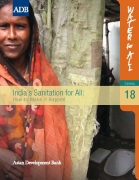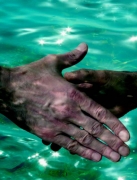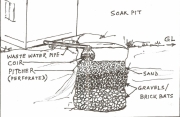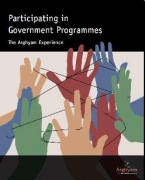India
The power of uncertainty: Reflections on the nature of transformational initiatives - Malcolm Adiseshiah Centenary Lecture by Mihir Shah
Posted on 26 May, 2010 11:21 PMIn this lecture, the author makes connections between the concepts of certainty and uncertainty and draws parallels between these and the scientific or the positivist approach and the phenomenalist approach. The author argues that the excessive emphasis on certainty, which is an inherent assumption of the scientific approach embraces reductionism, compartmentalisation and has been the principle underlying all disciplines such as developmental economics.
India's Sanitation for All: How to make it happen - An ADB report
Posted on 26 May, 2010 11:02 AM This discussion paper by ADB, examines the current state of sanitation in India in the context of the Millennium Developmental Goals, which call for a 50% reduction in the proportion of people without sanitation by 2015 and India's goal of providing Sanitation for All by the 2012.
This discussion paper by ADB, examines the current state of sanitation in India in the context of the Millennium Developmental Goals, which call for a 50% reduction in the proportion of people without sanitation by 2015 and India's goal of providing Sanitation for All by the 2012.
The paper targets policy makers, governmental ministries, state and local governments, non-governmental organisations, developmental agencies and all those who are involved in the planning and implementation of sanitation policies in India. It makes a few recommendations for the successful implementation of sanitation efforts in India.The focus of these recommendations is on household sanitation, which includes safe disposal of human excreta, as measured by household ownership of a sanitary latrine and household access to drainage facilities.
Negotiate: Reaching agreements over water - Paper by IUCN
Posted on 25 May, 2010 06:49 PM This book by IUCN is directed at practitioners involved in water-related negotiations that aim at fair and mutual agreements on optimum and sensible use of water by all. The book provides the necessary motivation, ideas, tools and inspiration for people involved in water negotiations throughout the world.
This book by IUCN is directed at practitioners involved in water-related negotiations that aim at fair and mutual agreements on optimum and sensible use of water by all. The book provides the necessary motivation, ideas, tools and inspiration for people involved in water negotiations throughout the world.
Many a times, the underlying approach to negotiations involves bargaining and competition. However, the book believes that emphasis on constructive engagement involving multiple perspectives and consensus building can lead to fair and equal distribution of this valuable resource to everyone.
The book is divided into five chapters that give out important key messages as to how to go about the process of negotiating:
Channel network delineation and catchment area demarcation of ponds: A GIS-based application
Posted on 25 May, 2010 03:06 PMContent Courtesy: GIS Development
Forwarded to the portal by: Sangeeta Deogawanka
Ponds are important sources of fresh water in the world as they store surface runoff produced by the storms. In this research paper, demarcation of the portion of land contributing runoff to ponds in village Nandgaon (Uttar Pradesh) has been done using topographical information of the surrounding area of the ponds, in a GIS interface.
School water, sanitation and hygiene education - Paper by Water for People
Posted on 24 May, 2010 04:52 PM This document by Water for People, emphasises the importance of appropriate sanitation coverage in schools that is gender sensitive and culturally acceptable to the needs of both boys and girl students, rather than the exclusive focus on adequacy of facilities.
This document by Water for People, emphasises the importance of appropriate sanitation coverage in schools that is gender sensitive and culturally acceptable to the needs of both boys and girl students, rather than the exclusive focus on adequacy of facilities.
It discusses the case of schools in rural areas in West Bengal where it was found that although the coverage of sanitation facilities was reasonable, lack of adequate availability of water, lack of consideration to student differences in terms of age and gender in the construction of latrines and drinking water facilities, poor systems of maintainence and disposal of wastes made the sanitation facilities inappropriate for use.
Rank of Indian cities on sanitation (2009-10) - National Rating and Award Scheme for Sanitation in Indian Cities (MoUD)
Posted on 24 May, 2010 02:18 PMIn order to get a sense of the current status of sanitation in India's cities, a survey was initiated by the Ministry of Urban Development as a part of the National Rating and Award Scheme for Sanitation for Indian Cities. The methods used for the survey can be found on the Ministry of Urban Development website.
The findings and the rankings of the cities according to the survey found that the situation was grim with only 25 cities topping the list, while majority of the others lagged behind in terms of a number of sanitation parameters.
Participating in Government Programmes - The Arghyam Experience (2010)
Posted on 21 May, 2010 01:25 PM Arghyam, a civil society organisation working on water issues since 2005, has participated in drinking water programmes involving State Governments since its inception, either directly or by partnering with local Civil Society Organisations (CSOs).
Arghyam, a civil society organisation working on water issues since 2005, has participated in drinking water programmes involving State Governments since its inception, either directly or by partnering with local Civil Society Organisations (CSOs).
This publication documents Arghyam's and its partners' collective experiences in participating in these Government programmes and puts forward key learnings and challenges.
The various programmes include - Sachethana, a school rooftop rainwater harvesting programme, and Suvarnajala, a flouride mitigation programme, both in Karnataka; Pani Thiye Panjo, a decentralised drinking water management programme in Gujarat; and Mazhapolima, an open-well recharge programme in Kerala.
Jobs via Devnetjobs - dated 19 May, 2010
Posted on 18 May, 2010 02:47 PMContent Courtesy:DevNetJobsIndia
- Programme Manager - Drinking Water
Lanco Foundation
Location: Gurgaon - Haryana
Last Date: May 24, 2010
Increasing transparency and accountability – Another win!
Posted on 14 May, 2010 11:31 AMGuest Post: Amrtha Kasturi Rangan, Arghyam
“When a State Government instead of itself undertaking a work, if it allows an agency like the petitioner Company by substantially funding them to undertake such work which is essentially that of a municipality, no one can say that such work of the petitioner company as a private activity. On the other hand, it is very much a public activity over which public interest can generate”.
Judgement in WP NO. 9794 of 2008 and M.P. Nos. 1 and 2 of 2008
The Right to Information (RTI) Act, 2005 was enacted to ensure transparency and accountability. As per the Act any citizen can write and ask for information from a “public authority”. The Act also requires that public authorities make information about themselves available to the public – mandatory disclosure.
From its time of enactment, there have been several challenges in operationalizing the RTI Act. A progressive civil society has constantly challenged hesitation and delay in providing information. Several ambiguities have required judicial intervention to interpret the letter and the spirit of the Act. Here we look at the success of widening the scope of accountability to include private agencies who partner with the government under the Public Private Partnership (PPP) model.
Sankalp awards 2010 winners : SarvaJal & Shramik 3S recognised for their double bottomline(social and financial) returns
Posted on 11 May, 2010 04:28 PM
The Sankalp 2010 Awards and Investment Forum is an annual Intellecap initiative committed to catalyzing entrepreneurship in the social enterprise space. Sankalp actively facilitates collaboration between established and budding entrepreneurs, investors, thought leaders and sector stakeholders interested in contributing effectively towards this fledgling yet fast-growing industry.
With a strong focus on double bottomline (social and commercial) enterprises Sankalp, in its second edition, aims to accelerate investment in this space through the showcase of pioneering, sustainable and innovative enterprises capable of long term social impact. Sankalp's primary goal is of bringing together various stakeholders sharing a common conviction that capital should be invested to create multiple bottom-line returns (financial, social and environmental) and not exclusively financial (profit-maximizing) or social (philanthropic) returns.
Thus having successfully established a niche for itself; Sankalp has taken the lead in recognizing those businesses that have mastered the balancing act between the profit and social objectives. Sankalp 2010 Forum and Awards shall recognize, award and connect the most investible social MSMEs (Micro, Small and Medium enterprises) operating in 5 high impact sectors: